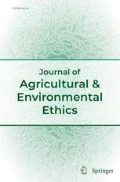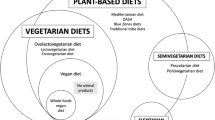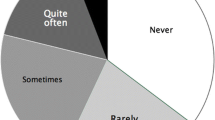Abstract
It is argued that the question of whether or not one is required to be or become a strict vegetarian depends, not upon a rule or ideal that endorses vegetarianism on moral grounds, but rather upon whether one's own physical, biological nature is adapted to maintaining health and well-being on a vegetarian diet. Even if we accept the view that animals have rights, we still have no duty to make ourselves substantially worse off for the sake of other rights-holders. Moreover, duties to others, such as fetuses and infants, may require one to consume meat or animal products. Seven classes of individuals who are not required to be or become vegetarians are identified and their examption is related to nutritional facts; these classes comprise most of the earth's population. The rule of vegetarianism defines a special or provisional duty rather than any general or universal rule, since its observance it based upon the biological capacities of individual humans whose genetic constitution and environment makes them suitably herbivorous. It is also argued that generalizing the vegetarian ideal as a social goal for all would be wrongful because it fails to consider the individual nutritional needs of humans at various stages of life, according to biological differences between the sexes, and because it would have the eugenic effect of limiting the adaptability of the human species. The appeal to the natural interests of omnivores will not justify any claim that humans may eat amounts of meat or animal products in excess of a reasonable safety margin since animals have rights-claims against us.
Similar content being viewed by others
References
Alexander, Richard D. 1987.The Biology of Moral Systems. New York: Aldine de Gruyter.
Allen, L.H. 1986.Nutrition Today, 21: 6.
Council on Scientific Affairs, American Medical Association. 1987.Journal of the American Medical Association, 257: 1929.
Dickinson, R.E. 1986. Impact of Human Activities on Climate — A Framework. InSustainable Development of the Biosphere, edited by W.C. Clark and R.E. Munn. Cambridge: Cambridge University Press for the International Institute for Applied Systems Analysis.
Dwyer, J.T., R. Palombo, H. Thorne, I. Valadian, and R.B. Reed. 1978.Journal of the American Dietetic Association, 72: 264.
FDA. 1982.FDA Drug Bulletin, 12: 5.
Festa, M.D., H.L. Anderson, R.P. Dowdy, and M.R. Ellersieck. 1985.American Journal of Clinical Nutrition, 41: 285.
Hamilton, Eva May Nunnelley, Eleanor Noss Whitney, and Frances Sienkiewicz Sizer. 1984. Controversy: World Hunger, chap. 6. InNutrition: Concepts and Controversies, 3rd ed. St. Paul: West Publishing Co.
Hartz, S.C. and J. Blumberg. 1986.Clinical Nutrition, 5: 130.
Herbert, V. and G. Tisman. 1973. InBiology and Brain Dysfunction, edited by G. Gaull, vol. 1. New York: Plenum Press.
Herbert, Victor. 1984. Vitamin B-12. InNutrition Reviews' Present Knowledge in Nutrition, 5th ed. Washington, DC: The Nutrition Foundation, Inc.
Hurnik, J.F. 1979/80. Animal Welfare and Modern Agriculture,Animal Regulation Studies, 2: 145–154.
Lappé, Frances Moore. 1975.Diet for a Small Plant. New York: Ballantine Books.
Mayer, J. 1973.Journal of Family Health, 5: 32.
McBean, Lois D., M.S., R.D., ed. 1987. Dairy Council Digest, 58(2): 9.
McDonald, J.T. 1986.Clinical Nutrition, 5:27.
Myers, Norman. 1985. The End of the Lines,Natural History, 94: 2, February.
Pond, Wilson G., Robert A. Merkel, Lon D. McGilliard, and V. James Rhodes, eds. 1980.Animal Agriculture: Research to Meet Human Needs in the 21st Century, Executive Summary. Boulder, CO: Westview Press.
Regan, Tom. 1983.The Case for Animal Rights. Berkeley: The University of California Press.
Rollin, Bernard. 1981.Animal Rights and Human Morality. Buffalo: Prometheus.
Ruse, Michael. 1986.Taking Darwin Seriously: A Naturalistic Approach to Philosophy. Oxford: Basil Blackwell.
Sapontzis, Stephen. 1987.Morals, Reason, and Animals. Philadelphia: Temple University Press.
Shull, M.W., R.B. Reed, I. Valadian, R. Palombo, H. Thorne, and J.T. Dwyer. 1977.Pediatrics, 60:410.
Singer, Peter. 1979. Killing Animals and Killing Humans,Inquiry, 22: 145–156.
Solomons, N.W. 1986.Nutrition, 5: 167.
Tangley, Laura. 1988. Studying (and Saving) the Tropics,Bioscience, 38(6): 375.
Whitney, Eleanor Noss and Eva May Nunnelley Hamilton. 1987.Understanding Nutrition, 4th ed. St. Paul: West Publishing Co.
Author information
Authors and Affiliations
Rights and permissions
About this article
Cite this article
George, K.P. So animal a human ..., or the moral relevance of being an omnivore. Journal of Agricultural Ethics 3, 172–186 (1990). https://doi.org/10.1007/BF02014612
Issue Date:
DOI: https://doi.org/10.1007/BF02014612




